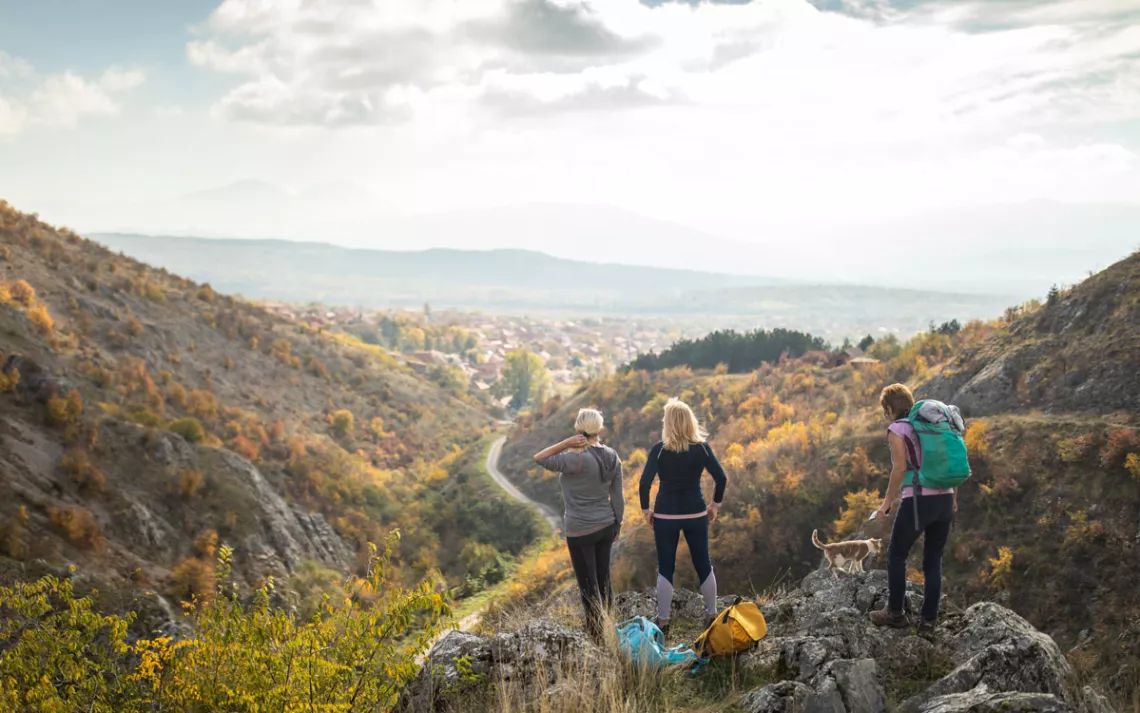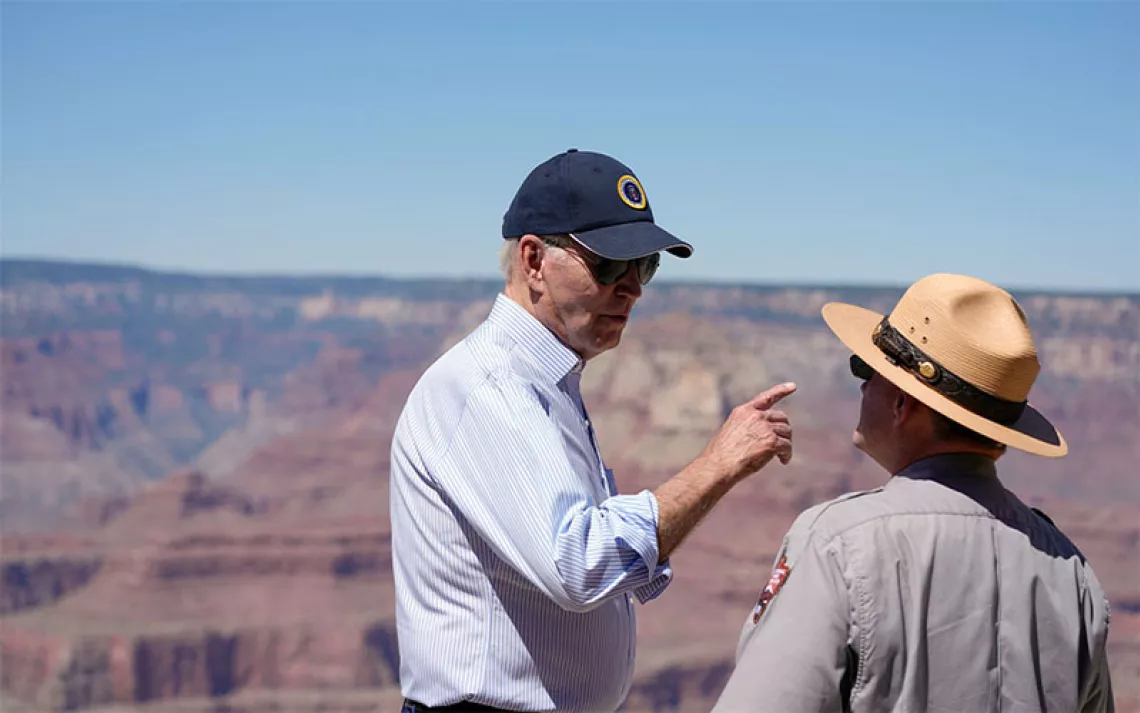The Explore Act Will Be a Boon for Outdoor Recreation
Congress considers the largest outdoors package of President Biden’s term

Photo by miodrag ignjatovic/iStock
Update: On Tuesday, April 9, the House passed the Expanding Public Lands Outdoor Recreation Experiences (EXPLORE) Act. House lawmakers are now urging their Senate colleagues to vote on a companion bill so that the two can be combined into one final text before heading to President Biden's desk to become law.
If you've ever wanted to cycle long distances on public land, climb a rock face in a wilderness area, or know that your fourth grader will receive free admission to a national park, you're in luck. Congress is poised to pass a legislative package that combines more than a dozen bills designed to make it easier for people to access public lands, from national parks to national forests. The landmark bill is the Expanding Public Lands Outdoor Recreation Experiences (EXPLORE) Act, and supporters say leaders in Congress are closer than ever to bringing it to a floor vote, allowing it to become law.
One of the surest signs of the EXPLORE Act’s chances of success is its bicameral and bipartisan sponsorship, with nearly an equal number of Democrats and Republicans cosponsoring the proposed law. The EXPLORE Act and a Senate version, called the America’s Outdoor Recreation Act, have already sailed out of committees in both chambers. And a diverse array of outdoor recreation groups have stepped up to champion both bills’ passage. Backers of the EXPLORE Act include the American Mountain Guides Association, Backcountry Hunters & Anglers, the Recreational Boating and Fishing Foundation, and the Outdoor Industry Association.
“At REI Co-op, we believe time outside is fundamental to a life well lived,” Taldi Harrison, the director of community and government affairs at REI Co-op, said in a press release in December, when the EXPLORE Act was introduced by 18 bipartisan sponsors. “We applaud Chairman [Bruce] Westerman, Ranking Member [Raúl] Grijalva, and the Committee members for coming together to make the outdoors more accessible, for everyone.”
Measures in the bill include requiring the federal agencies that manage public lands to restore defunct campsites, simplifying the permitting process for large group activities, and identifying new opportunities for recreation. In addition to outdoor groups, some conservation organizations have also spoken in favor of portions of the bill.
“There are barriers to families being able to safely or affordably access public lands. Some trails are inaccessible to people with mobility issues, parks may not be within walking distance to certain neighborhoods, or there are financial barriers,” Rob Scott, the deputy director of federal policy with the Sierra Club’s Outdoors for All campaign, said. “All communities deserve to enjoy nature and the outdoors. Legislation like the EXPLORE Act will unlock opportunities for families nationwide.”
The Sierra Club and groups like the National Parks Conservation Association are especially excited about three proposed bills in the package. The first is the Outdoors for All Act, which would permanently authorize the Outdoor Recreation Legacy Partnership program. Established during the Obama administration, the program offers cities matching grants to create green spaces in disadvantaged communities. The second is the Military Veterans in Parks Act, which would direct federal agencies to promote outdoor recreation among veterans, increase disability access to trails, and encourage the hiring of veterans for outdoor jobs. Another law in the combined legislation would extend the Every Kid Outdoors program, which allows all fourth graders and their families free administration to national parks for another seven years.
The EXPLORE Act couldn’t come at a better time. The outdoor recreation industry is one of the fastest-growing economic sectors in the US, increasing at roughly 5 percent annually. Nearly half of the country, 140 million people, visit public lands each year, pumping over $1 trillion into local economies. The Bureau of Land Management, which manages most national monuments, has seen a 35 percent increase in visitation from 2015 to 2022, according to the Center for American Progress. And over 300 million people have visited the national parks system for seven of the last 10 years. Spurred by this consistent rise in outdoor recreation, lawmakers have tried since 2019 to pass an outdoor recreation package.
"Americans’ love for our public lands and spending time outdoors is growing every year," Arizona Democratic representative Raúl Grijalva, one of the bill’s lead sponsors, said in a statement. "The increasing popularity of outdoor recreation is a boon for local economies and job creation, but we must make sure our public land management agencies have the tools, resources, and staff they need to keep up."
The EXPLORE Act will help make getting outdoors not only easier but also more enjoyable. One provision would encourage federal agencies to work with private businesses to help create housing and infrastructure in gateway towns near public lands and waters. One section would allow agencies to increase housing for federal employees near national parks. Another provision would require federal agencies to identify new trails and additional parking spots near high traffic areas.
Some of the other provisions, however, have puzzled conservation groups. Such is the case with a proposed rule that would allow people to take hides and antlers from national park sites and another that would require every Forest Service and BLM unit to have a shooting range.
“We do have some concerns about that bill in proximity to other recreation sites or proximity to national parklands,” Tucker Johnson, the legislative program manager at the National Park Conservation Association, said. “The bill was slightly modified to have some better language, but we still just, in general, don't love the idea of more firearms being on public lands adjacent to national parks.”
While the EXPLORE Act isn’t a conservation bill that protects large swaths of land or protects endangered species, there’s a lot to love in terms of the way it will expand access to public land. With the ever-rising crush of visitors only growing, this bill could offer a lifeline to areas that need investment. For the people who have advocated in support of the bill for years, its passage can’t come soon enough.
“This legislation will provide federal agencies with new tools they need to address recreation management and help more Americans reap the benefits of time spent outside, all while protecting the precious public lands and waters that make it all possible,” Jessica Wahl-Turner, president of the Outdoor Recreation Roundtable, said in a statement. “This is a much-needed and historic step forward."
 The Magazine of The Sierra Club
The Magazine of The Sierra Club



